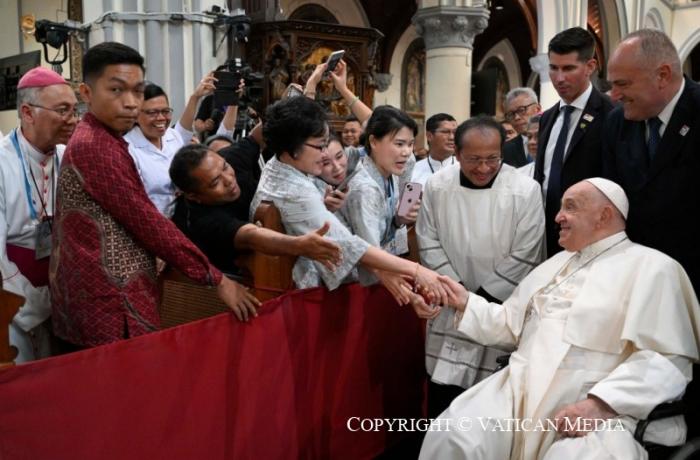“Proclaiming the Gospel does not mean imposing or opposing one’s faith to that of others,” Francis said in his meeting with bishops, clergy, and pastoral workers in Jakarta cathedral. Calling a catechist to him, he said that catechists carry the Church forward. “What keeps the world going is not the self-interest, it is the charity that is given.”
Jakarta (Indonesia) – “The Church is carried forward by catechists. They are the ones who go forward. Then come the nuns, right after the catechists, then come the priests, the bishop… But catechists are ‘at the front’, they are the strength of the Church,” said Francis this afternoon in the Cathedral of Our Lady of the Assumption in Jakarta.
Before beginning his address to the bishops, priests and pastoral workers of the Church in Indonesia, Pope Francis called on Agnes, a catechist who had addressed one of the greetings to the pontiff.
Francis wanted to emphasise the importance of people like her and all the people of God, addressing the representatives of all 37 Indonesian diocese in the meeting dedicated to the journey of the Church in this huge country.
“There are cardinals, there are bishops, there are priests, there are nuns, there are lay people, there are children,” Francis commented, “but we are all brothers and sisters. The pope, the cardinal, the bishop are not more important… All brothers. Everyone has his or her own task to make the people of God grow. Understood?”
“Faith, fraternity, compassion,” the three words chosen as the motto of this apostolic visit to Indonesia, were at the centre of the Pope’s address, which included many off-the-cuff remarks.
Card Ignatius Suharyo, the archbishop of Jakarta, was next to him, while the president of the Bishops’ Conference, Bishop Antonio Subianto Bunjamin of Bandung, addressed him an initial greeting, thanking the Holy Father also for the recently established Diocese of Labuan Bajo.
Indonesia itself speaks of faith. “It is a great country with enormous natural riches, in terms of flora, fauna, energy and raw materials, and so on. Such great wealth could easily be turned, seen superficially, into a reason for pride and arrogance, but, if considered with an open mind and heart, it can instead be a reminder of God, of his presence in the cosmos, in its life and in our lives, as Sacred Scriptures teach us. It is the Lord, in fact, who gives all this.”
As for fraternity, it is a style to which the Church is called, first of all, in evangelisation. “Proclaiming the Gospel does not mean imposing or opposing one’s faith to that of others,” Francis explained. “It does not mean proselytising, it means giving and sharing the joy of the encounter with Christ, always with great respect and fraternal affection for everyone.”
Quoting Fr Maxi Un Bria, a priest who spoke on behalf of all diocesan priests of Indonesia and said that the mission was “to walk hand in hand,” the pontiff stressed a prophecy of “communion, in a world where the tendency to divide, impose and provoke each other seems to be growing more and more. And do you know who is the person who makes the greatest divisions in the world? It’s the devil. Be careful!”
Finally, compassion. Some people are afraid of this word, Francis said; they “consider it a weakness, and they praise the shrewdness of those who pursue their own interests as if it were a virtue, keeping their distance from everyone. What keeps the world going is not self-interest, it is the charity that is given.”
Compassion “also means embracing dreams and desires for redemption and justice, taking care of them. This does not mean being ‘communist’: it means charity.”
Finally, “I encourage you to continue your mission, strong in faith, open to all in fraternity and close to each one in compassion,” Francis said, recommending to always welcome everyone into one’s own communities.
“I am so struck by that parable of the Gospel in which the wedding guests did not want to come and did not come. What does the Lord do? Does he get bitter? No, he sends his servants. ‘Go out, therefore, into the main roads and invite to the feast whomever you find.’”
“I am also thinking of many islands… And the Lord says to good people, to you: ‘everyone, everyone’. ‘But, Lord, that . . .’. ‘Everyone, everyone, bad and good alike. . . . I bless you, I thank you for the great good you do every day in all these beautiful islands. I pray for you. But, please, I ask you to pray for me.”
